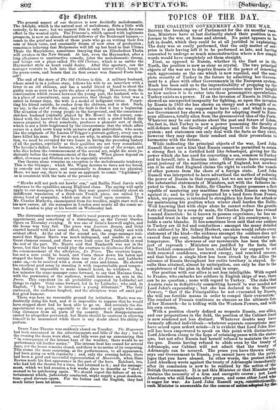Qtatrts.
The general aspect of our theatres is now decidedly melodramatic. The Ade1phi, which is the natural seat of melodrame, flirts a little with comedy, to be sure ; but we suspect this is only to gain breath for some effort in the wonted style. The Princess's, which opened with legitimate prospects, is now an almost fanatical follower of the Boulevard banner,— much to the grief and wrath of those poets who go on writing their five acts of blank verse, and constantly dream of new sites of production ; sometimes believing that Melpomene will lift up her head in that Ultima Thule the Marylebone, sometimes fancying that an Elisabethan Thalia will awaken in the New Strand. At last, even the Haymarket, after a long allegiance to unattractive comedy, joins the melodramatic throng, and brings out a piece called-Tye Old ChAteati, which is as unlike the Haymarket style as heart could desire. After this apostasy, can the manager venture to look into that oldfashioned mirror which hangs in the green-room, and boasts that its first owner was Samuel Foote him- self ?
The end of the story of The Old ChGteau is this. A military husband, Whose mind is in a)ealous state, follows his wife to an interview with a laver in an old chateau, and has a useful friend at hand to shoot the guilty man as soon as he quits the place of meeting. However, from the conversation which ensues between the young pair, the husband, who is in e place of concealment, soon perceives that though- the lover was a suitor in former days, the wife is a model of indignant virtue. Forget- ting his friend outside, he rushes from the chateau, and is shot. Such, we say, is the end of the story, and the fault is that it has a beginning. The situation of the young people in the foreground, and the conscience- stricken husband (capitally played by Mr. Howe) in the corner, com- bined with the known fact that there is a man with a pistol behind the scenes prepared to shoot somebody, produces a pleasant sort of 'thrill, which is not a little heightened by the circumstance that the whole affair occurs in a dark room hung with pictures of grim individuals, who seem, like the originals of Sir Lucius O'Trigger's portrait-gallery, every one to have killed his man. But we do not see why, to attain this strong situa- tion, we need be occupied for two hours in having the preceding history of all the parties, especially as their qualities are not very remarkable. The heroine's father, for instance, who is entirely out of the scrape, and who dies before the commencement of the second act, might die more ju- diciously before the commencement of the first. When pieces depend on effect, slowness and dilution are to be especially avoided. One theatre alone remains an exception to the melodramatic tendency. This is the Olympic; which Mr. Wigan devotes to farce not too broad, to comedy not too tame, and occasionally to dramas not too physical. Here, we may say, there is as near an approach to comic "legitimacy" as is consistent with the taste of the present day.


































 Previous page
Previous page